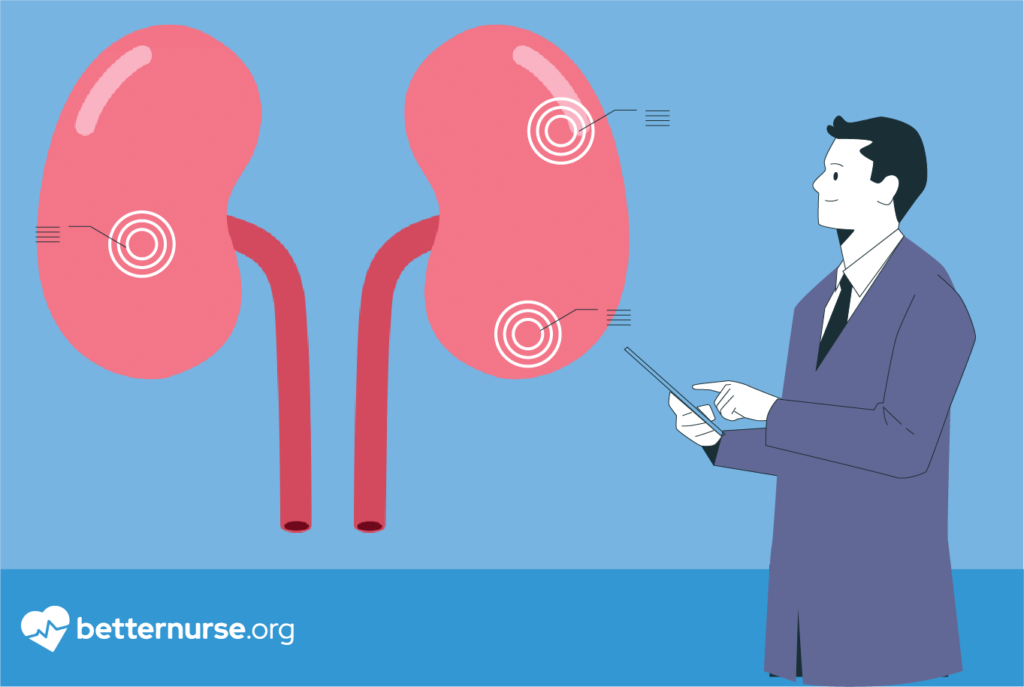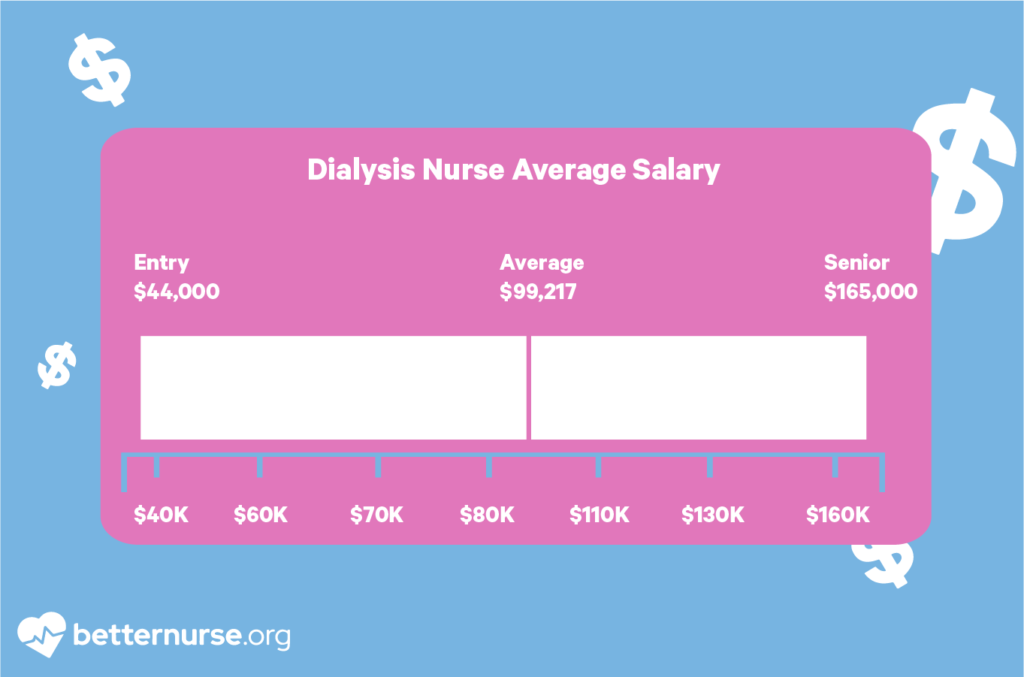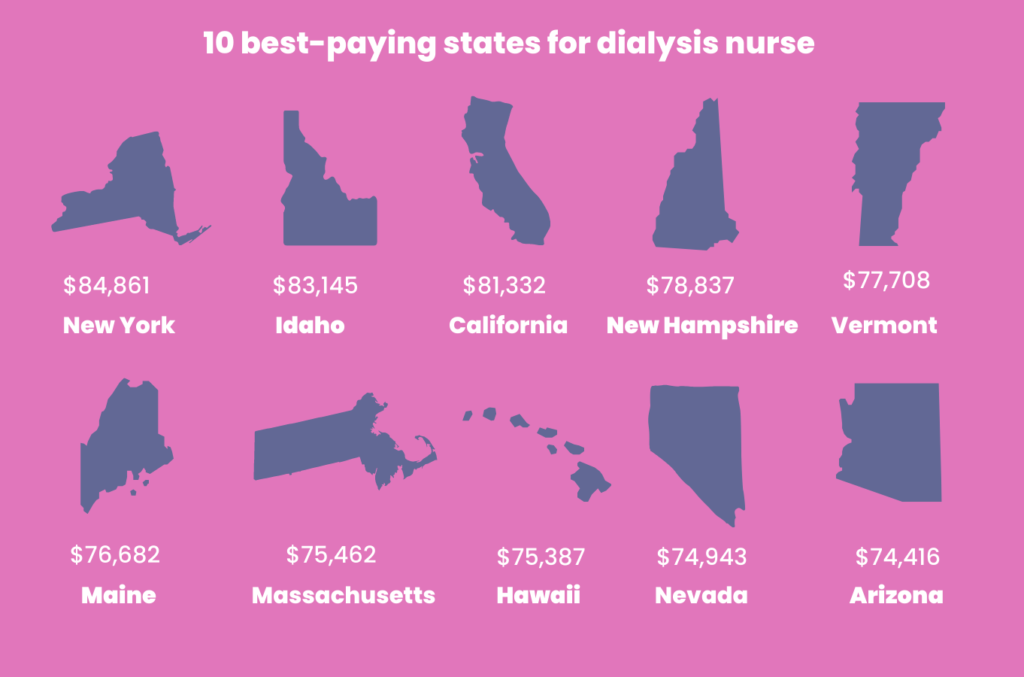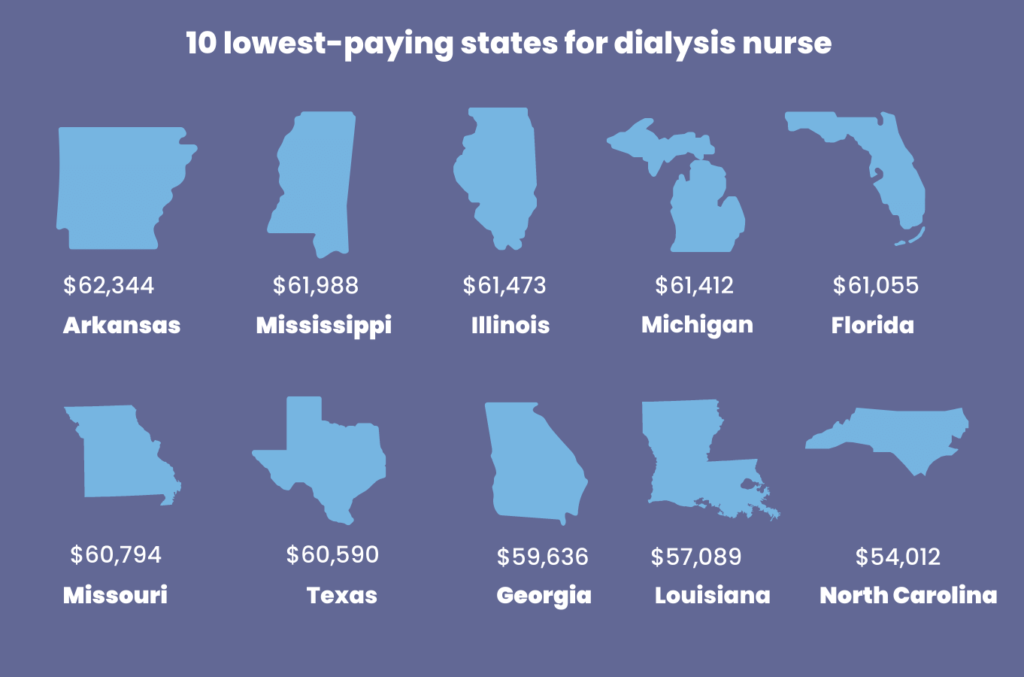Kidneys are needed to remove waste and excess fluids from the body. Unfortunately, over 1 in 7 US adults, or around 37 million people, suffer from Chronic Kidney Disease (CKD). Amongst the many healthcare professionals that help these people are dialysis nurses.
Working as a dialysis nurse can be a rewarding yet demanding and stressful career path. Therefore, when considering becoming a nurse in that area, you should assess the financial compensation expected for that position. In this article, we will explore the role of a dialysis nurse, the average dialysis nurse’s salary expectations, and some factors that can impact that earning potential.
Table of contents
What Is a Dialysis Nurse?

A dialysis nurse is a specific type of nephrology nurse. Nephrology nurses, in general, are specialized healthcare professionals trained to provide care to patients experiencing or at risk of experiencing kidney problems. In addition, dialysis nurses, in particular, oversee the dialysis treatment required by patients at the end stage of kidney failure. They help patients navigate dialysis as a life-saving procedure by helping clear the waste in their kidneys and maintain a balance of chemicals in the body through a dialyzer.
These nurses are required to administer treatment, monitor their patient’s vital signs, and be ready to respond to whatever complications may arise. Furthermore, on top of the physical care, dialysis nurses must also provide emotional support and counseling for patients and their family members as they navigate the challenges of kidney disease.
You can find these nurses working in different settings, such as dialysis clinics, hospitals, and outpatient clinics. In some cases, dialysis nurses also travel to the patient’s home to provide treatment.
How To Become a Dialysis Nurse
The path to becoming any type of nurse can be different for each individual. Some dedicate many years to advancing their education and only enter the workforce after they have completed their education. Others might prefer to combine education and experience in order to grow professionally.
Generally, if you are interested in becoming a dialysis nurse, the best way to achieve that goal is through the following steps:
Education
The first step to becoming a dialysis nurse is to complete an associate’s degree or bachelor’s degree program in nursing from an accredited nursing school. As you obtain your nursing education, you will learn the foundations of patient care and take the first step toward becoming a registered nurse. This step is crucial in launching your nursing career.
NCLEX-RN exam
In order to become a licensed registered nurse, you must pass the NCLEX-RN exam (National Council Licensure Examination – Registered Nurses) after completing your nursing education. The exam is used to test your knowledge of nursing as well as the ability to apply that knowledge and skills in the workplace. Upon completing the examination, you will be considered eligible to practice entry-level nursing.
You can find here some resources to help you prepare for that exam if that’s where you’re at.
Experience
Before establishing yourself as a dialysis nurse, you will most likely need to gain experience working in healthcare settings. Through that initial experience working in a hospital or some other care facility, you further develop the general skills and knowledge needed to provide care to patients. Then, you can transfer those skills to treating patients with end-stage kidney disease.
Certification
Dialysis nurses can benefit from becoming certified in their field of work. There are various certifications you can pursue. The Nephrology Nursing Certification Commission offers two excellent certification options—the Certified Dialysis Nurse Certification (CDN) and the Certified Nephrology Nurse-Nurse Practitioner (CNN-NP). Both certifications can demonstrate your skills and knowledge in caring for patients suffering from kidney disease. Furthermore, they are widely recognized and appreciated by employers across the country.
Continuing education
Lastly, the profession of a dialysis nurse allows you to grow from entry-level jobs to managerial positions as long as you show commitment and dedication to advancing your knowledge and skills. In addition to the certifications, there is the possibility of continuing your education. This step will ensure that you stay up to date with the latest advancements in the field and therefore are eligible to provide the best possible treatment for your patients.
Dialysis Nurse Average Salary

Dialysis nurses are a crucial part of the healthcare system and are compensated well. Data shows that the national average salary for dialysis nurses is nearly six figures. As of March 2023, dialysis nurses in the United States earn $99,217 a year—the annual salary can be as low as $44,000 or as high as $165,000 per year.
The exact salary depends on several factors, including your role within the facility. For example, the average acute dialysis nurse salary is reported to be $87,708 per year, the average travel dialysis nurse salary is $86,792 per year, and the annual salary for a davita nurse in the United States is $79,227 a year. So, everything depends on your position, your experience, and the location where you practice.
Salary based on years of experience
Dialysis nurse salaries tend to increase with experience. According to salary data from Glassdoor, entry-level dialysis nurses with one to three years of experience can expect to earn an average salary of $83,082 per year. Additionally, dialysis nurses with four to six years of experience can earn an average salary of $87,858 per year, and those with seven to nine years of experience earn $92,477 annually.
Once you surpass ten years of experience, you earn around $97,948 per year, whereas if you have more than 15 years of experience, you can expect to earn an average salary of $101,715 per year.
Salary based on location
The location can also have a significant impact on your salary. According to data, the U.S. states with the highest average salaries for dialysis nurses are New York, Idaho, and California. To be more precise, here is a list of the top ten-highest paying states:

On the other hand, the same report shows that the top ten lowest-paying states are the following:

Dialysis nurse salary compared to other similar jobs
It is worth mentioning that dialysis nurses earn higher salaries than many other nurses. For example, generally, the national average salary for a registered nurse in the United States is $77,976 per year, which is much lower than the average salary for a dialysis nurse. Similarly, charge nurse practitioners earn only $69,474 per year.
However, dialysis nurses earn less compared to some highly specialized nursing positions, such as certified registered nurse anesthetists (CRNA) or neonatal intensive care unit (NICU) nurses, who earn an average salary of $225,555 and $136,005, respectively.
Job Prospects for Dialysis Nurses
The job outlook for registered nurses, which includes dialysis nurses, is promising. According to the U.S. Bureau of Labor Statistics (BLS), employment of registered nurses is expected to increase by 6%, with about 203,200 new job openings each year throughout the decade.
The work of dialysis nurses in administering treatment is highly valued by healthcare facilities. Therefore, job growth is natural across various settings.
Conclusion
Becoming a successful dialysis nurse requires education, experience, and certification. By earning a nursing degree, passing the NCLEX-RN exam, gaining nursing experience, earning certifications, and continuing to stay informed about trends and discoveries in the field, you can become a highly skilled dialysis nurse who is well compensated for their work.
Become a dialysis nurse and enjoy a fulfilling and lucrative career. Every day, you will be helping patients keep fighting even when their kidneys are ready to give up.

Nurse Luke is a CRNA who specializes in Nursing content and still enjoys a very busy career with Locum, Per Diem and Travel nursing in the greater midwest. He has over 25 years of experience in the healthcare field and received his CRNA masters degree from the Mayo Clinic School of Healthcare. He is passionate about helping nurses explore the options of becoming a travel nurse as well as spending time with his Family.



